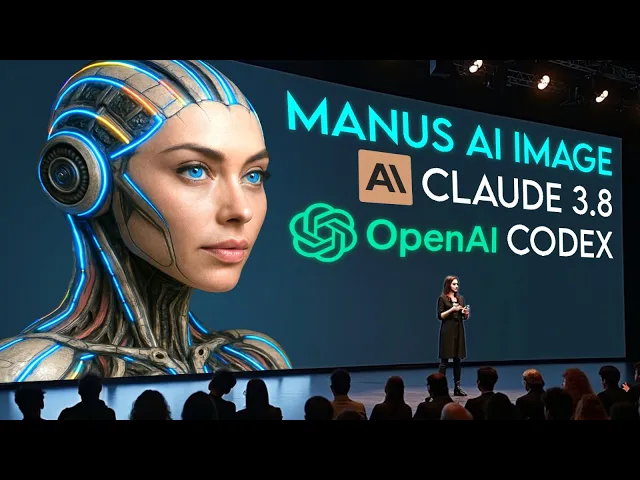OpenAI Drops CODEX AGENT, Manus AI New Upgrade, New Claude 3.8 Sonnet + More AI News

AI revolution is reshaping workforces now
In a landscape where AI innovation is accelerating at breakneck speed, the intersection of cutting-edge technology and workforce transformation has become the new battleground for organizations seeking competitive advantage. The latest developments from industry leaders like OpenAI, Anthropic, and Manus AI aren't just incremental improvements—they represent paradigm shifts in how we conceptualize the relationship between human workers and artificial intelligence systems.
Key Points
- The release of OpenAI's Codex Agent signals a fundamental shift from tools that require human prompting to autonomous systems that can identify problems and execute solutions independently
- Claude 3.8 Sonnet's availability unlocks enterprise-grade AI capabilities at a significantly lower price point ($3/million tokens vs $15/million for GPT-4), democratizing access to advanced AI
- Workflow automation tools are evolving from simple task performers to sophisticated systems that can seamlessly integrate with human teams, adapting to existing processes rather than requiring workers to adapt to them
The Dawn of True AI Agency
Perhaps the most profound insight emerging from these developments is the transition from AI as a tool to AI as an agent. OpenAI's Codex Agent represents a crucial evolutionary step beyond conventional coding assistants. Rather than waiting for human prompts, these systems actively monitor development environments, identify potential issues, and autonomously generate solutions—all while providing transparent explanations of their reasoning.
This shift matters immensely because it fundamentally changes how organizations approach AI implementation. Instead of viewing AI as merely a productivity enhancer that reduces manual labor, forward-thinking companies are now deploying AI as collaborative partners that augment human creativity and strategic thinking. The real power isn't in replacing workers—it's in elevating their capabilities by handling routine tasks while allowing humans to focus on higher-order problems.
Beyond the Headlines: The Human Element
What's often missing in discussions about AI advancement is a nuanced understanding of how these technologies reshape organizational psychology. A recent McKinsey study found that companies implementing AI as collaborative partners rather than replacement technologies saw 37% higher employee satisfaction and 28% greater productivity gains than those pursuing pure automation strategies.
Consider Spotify's engineering team, which has been experimenting with AI agents similar to Codex. Rather than reducing their engineering workforce, they've redeployed talent towar
Recent Videos
How To Earn MONEY With Images (No Bullsh*t)
Smart earnings from your image collection In today's digital economy, passive income streams have become increasingly accessible to creators with various skill sets. A recent YouTube video cuts through the hype to explore legitimate ways photographers, designers, and even casual smartphone users can monetize their image collections. The strategies outlined don't rely on unrealistic promises or complicated schemes—instead, they focus on established marketplaces with proven revenue potential for image creators. Key Points Stock photography platforms like Shutterstock, Adobe Stock, and Getty Images remain viable income sources when you understand their specific requirements and optimize your submissions accordingly. Specialized marketplaces focusing...
Oct 3, 2025New SHAPE SHIFTING AI Robot Is Freaking People Out
Liquid robots will change everything In the quiet labs of Carnegie Mellon University, scientists have created something that feels plucked from science fiction—a magnetic slime robot that can transform between liquid and solid states, slipping through tight spaces before reassembling on the other side. This technology, showcased in a recent YouTube video, represents a significant leap beyond traditional robotics into a realm where machines mimic not just animal movements, but their fundamental physical properties. While the internet might be buzzing with dystopian concerns about "shape-shifting terminators," the reality offers far more promising applications that could revolutionize medicine, rescue operations, and...
Oct 3, 2025How To Do Homeless AI Tiktok Trend (Tiktok Homeless AI Tutorial)
AI homeless trend raises ethical concerns In an era where social media trends evolve faster than we can comprehend them, TikTok's "homeless AI" trend has sparked both creative engagement and serious ethical questions. The trend, which involves using AI to transform ordinary photos into images depicting homelessness, has rapidly gained traction across the platform, with creators eagerly jumping on board to showcase their digital transformations. While the technical process is relatively straightforward, the implications of digitally "becoming homeless" for entertainment deserve careful consideration. The video tutorial provides a step-by-step guide on creating these AI-generated images, explaining how users can transform...
